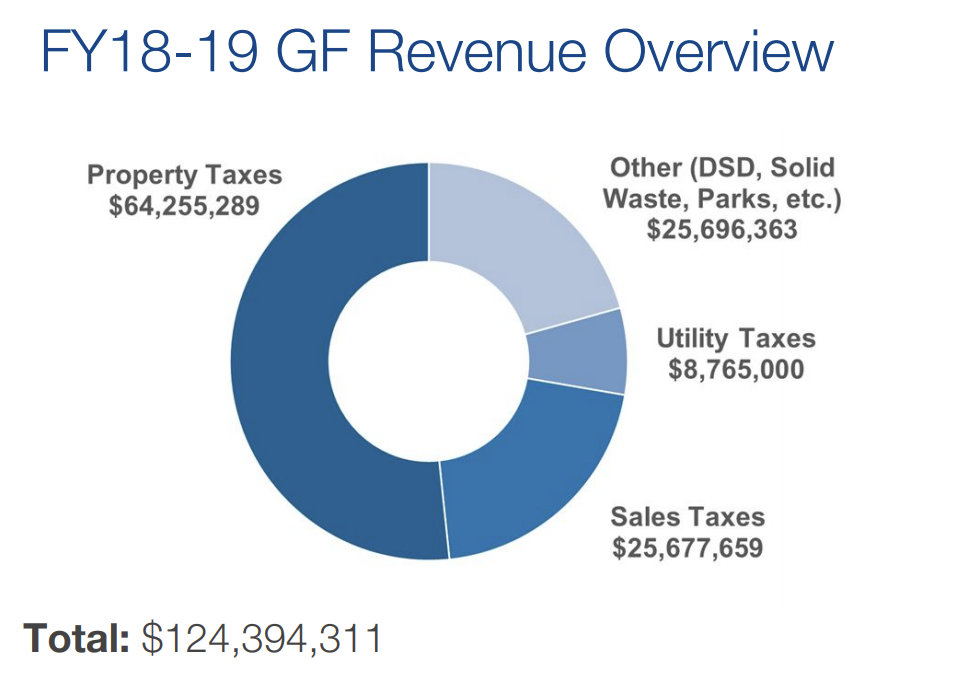Asheville’s city government kicked off a tour of its budget on Aug. 28, and “work session groupies,” as Mayor Esther Manheimer jokingly called attendees at the first meeting, will be able to follow the spending every step of the way. During monthly events scheduled through Tuesday, Dec. 11, staff will explain to City Council members and the public how the city allocates over $180 million to provide a range of services.
The first work session set the general context for Asheville’s budget. Barbara Whitehorn, the city’s chief financial officer, began by offering a “community profile” of the city and its demographics. While the area has a reputation for attracting an older retiree population, she explained, more of Asheville’s citizens fall into the 25-29 age range — 9.2 percent — than any other five-year range.
“We actually have a really high percentage of millennials, which is kind of exciting for our city’s future. That sounds like I’m a grandma saying that, but it really is,” Whitehorn said.
The city is younger compared with the rest of North Carolina; it is also whiter, with approximately 12.3 percent black residents in 2016 versus 22.2 percent in the state as a whole. Whitehorn noted that Asheville’s percentage of African-Americans has decreased from 17.6 percent in 2000, a change she attributed to a combination of white influx and black exodus.
Asheville’s unemployment rate of 3.2 percent is lower than that of any other North Carolina city of comparable size. “We are at a point where they start to talk about a lack of people for available jobs,” Whitehorn said. She also pointed out that unemployment is not evenly distributed: Black residents are approximately 2½ times more likely to be unemployed than the average, while Latino residents are over twice as likely to be working.
But one of the most important demographics to consider when designing the budget, Whitehorn suggested, is people who don’t live in Asheville. A daily swell in population due to commuters and tourists — an average of nearly 70,000 people per day in 2016 — leads to unusually high demand on city services.
For example, Whitehorn said, Asheville’s Fire Department fields significantly more calls for fire service than predicted by national benchmarking data. Asheville also experiences roughly 60 percent more property crime and 29 percent more violent crime than the national average for cities of comparable size. Its pavement condition index, a measure of road quality, is worse than that of all other large cities in the state besides Greensboro.
Tony McDowell, the city’s budget manager, followed Whitehorn’s remarks with an overview of the government’s income streams. The majority of Asheville’s revenue, over $64 million, comes from property taxes on real estate, personal property, public utilities and motor vehicles. The remaining $60 million consists of sales taxes, utility taxes and other sources such as solid waste fees.
McDowell emphasized that, while Asheville’s property tax rate of $0.4289 per $100 of assessed value is actually on the low end of comparable cities in the state, the city’s high property values lead to a median residential tax bill of $909, roughly in the middle of the North Carolina pack. Asheville’s median home value is roughly $212,000, compared with $157,000 for the state average.
Although the work session was not open to public comment, as is standard practice for similar meetings, Council members encouraged citizens to send their feedback by phone and email. “We’d love to hear your comments and your questions, so if these questions are sent to us, then we can ask those questions also,” said Council member Brian Haynes.
The next budget work session takes place at 3 p.m. on Tuesday, Sept. 25, in council chambers, located on the second floor of City Hall at 70 Court Plaza, Asheville. The full meeting agenda and supporting documents are available five days before each meeting date at avl.mx/59r.





Before you comment
The comments section is here to provide a platform for civil dialogue on the issues we face together as a local community. Xpress is committed to offering this platform for all voices, but when the tone of the discussion gets nasty or strays off topic, we believe many people choose not to participate. Xpress editors are determined to moderate comments to ensure a constructive interchange is maintained. All comments judged not to be in keeping with the spirit of civil discourse will be removed and repeat violators will be banned. See here for our terms of service. Thank you for being part of this effort to promote respectful discussion.